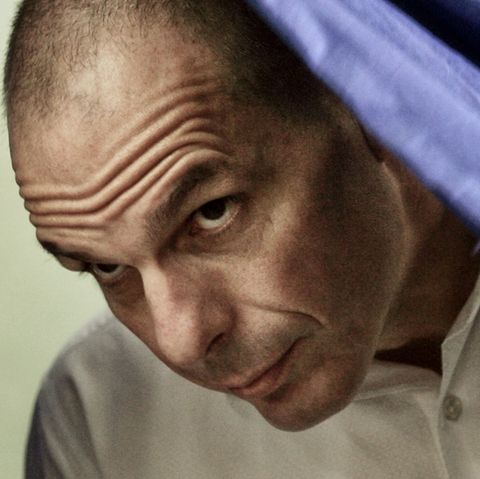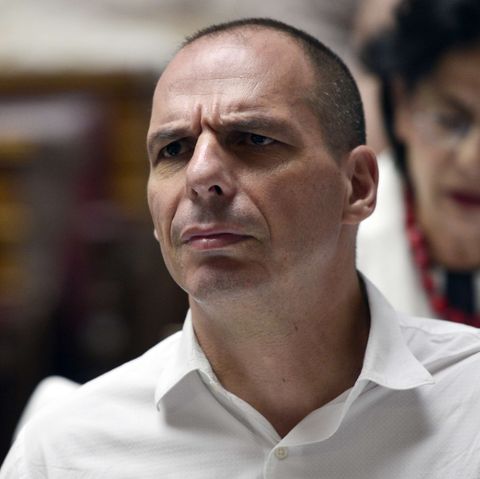The interview with Yanis Varoufakis had originally been scheduled to take place on the island of Aegina – far from the hectic rush of Athens, in peace and quiet, focussed and without interruptions. But peace and quiet is all but impossible to find in present-day Greece, even less so for a recently resigned finance minister still caught in the maelstrom of a political crisis: a hero for some, an object of hatred for others.
Varoufakis calls just shortly before our departure for Athens. The interview must take place in Athens, these are “hectic and stressful times”. Ongoing meetings, conferences, special parliamentary debates called at short notice leave him very little time. Why not come to his apartment to ensure a serious exchange? This was the only option, and so it came about: sometimes the conversations took place late at night, sometimes early in the morning; occasionally at lunch, in a restaurant or in his kitchen in the company of Varoufakis’ wife Danae Stratou.
A spectre is rising over Europe, Mr Varoufakis, the spectre of Syriza. All the powers of old Europe have entered into a holy alliance in an attempt to exorcise this spectre: the troika and the Eurogroup, Chancellor Merkel, her finance minister Wolfgang Schäuble, the Social Democratic Party leader Sigmar Gabriel, Finland’s government and the investors at Goldman Sachs.
I cannot help but laugh at the fact that someone from Germany, a country whose government is so bent on tormenting us, comes here with a variation on Marx’ ‘Communist Manifesto’. Of course it’s an insidious allegation to put Syriza on a level with Communism. It’s what our enemies do to discredit us.
That’s no longer necessary, after all, the spectre of Syriza has now been tamed, humiliated.
That’s one way of looking at it.
You’ve accepted the conditions of the Eurogroup, including cuts in pensions and a drastic increase in value added tax – all of which you vehemently opposed for years.
That’s how it is. And I’m still opposed. During my time in government I fought against this so-called rescue package. It’ll bring misery and suffering but most certainly no economic growth. However, I wouldn’t say that the people were deceived. Perhaps it’s even worse: we deceived ourselves.
I’ve brought along a photograph. It shows Wolfgang Schäuble and the President of the Eurogroup, Jeroen Dijsselbloem, shortly after your Prime Minister, Alexis Tsipras, accepted the bailout package.
It’s not a bailout package, it’s a dictate. Show me the picture. My God! I’ve never seen this. I have to take a picture of it. It’s incredible how pleased they look! That was on Monday, July 13. Greece is hanging from the gallows and yet they’re celebrating the biggest assault on European democracy since the end of the Second World War. They’re laughing as they bury the values, ideals and principles of democracy.
What you say is foolhardy. This is about providing a rescue package…
No!
… about help for your country! Billions and billions of euros are being pumped into the Greek economy.
Stop hassling us with all your help. It’s only forcing us into eternal servitude! De facto, this rescue package has turned Greece into a protectorate, a vassal state. The Eurogroup, which has absolutely no democratic legitimisation, is issuing orders to nations. They want humble subjects that do as they are told. This Eurogroup operates without any controls – and makes life and death decisions. The founding of the Eurogroup signalled the death of democracy. Who calls the shots in Europe? The banks? The people?
Your people voted for Syriza.
And that’s precisely the problem. I once spoke with the former US finance minister, Larry Summers. He said to me: “Yanis, you’ve made a huge strategic mistake.” I asked him in what way. “You won the election.” From the very outset, Syriza has borne the brunt of tremendous anger because we called a programme into question that has been the dominating and unchallenged doctrine in Europe for years: austerity. A policy of cuts that has been failing for years but that is systematically impoverishing our population. It leaves people feeling hopeless. Both young and old. What we are currently experiencing is the total triumph of neoliberalism. It spells the end of humanity.
If that is so, then why on earth did your friend Alexis Tsipras agree to these conditions?
What could he have done?
He could have said ‘No’, for example.
It was excruciating for him. They held a gun to his head – and that’s not a good bargaining position. You’re not free to decide when you’re constantly being told: “If you don’t concur, then the banks stay shut. We’ll crush you!”
You launched your election campaign with much fanfare. Your slogan being, “Hope is coming!”
Yes.
And the people believed you.
The situation was so desperate that they voted for us. At the end of 2014, just prior to the election, it was put about that we had reached an upswing. But that upswing was only down to the miracle of statistics. People knew full well that they were no better off. They knew it was all a bunch of lies. They voted for us despite the mood of doom and gloom being orchestrated against us in the media.
But then, six months ago, Tsipras stood before his supporters as the triumphant winner of the election, singing and dancing as he shouted: “This is the beginning of a new chapter for Greece! We’re leaving the devastation of austerity behind us!”
Yes. That was the dream, the hope.
And now the dream has turned into a nightmare.
Yes.
What I don’t understand is: you hold a referendum on the terms of the bailout. You win the referendum with a resounding vote, but then …
What then?
And then your government, which is supposedly so committed to its people, does precisely what the people did not want: it caves in to Brussels.
The about-turn that Tsipras performed was, how should I say, remarkable. I’ve experienced a lot in these past few months, much more than I ever wanted. One of the best things that happened to me was at an event two days before the referendum. I held a speech in front of thousands of people and the mood was so wonderful, it really energized me. I went back to the seat of government, buoyed by this positive force, but once I got there the atmosphere was so different. Nearly everyone was so despondent. It almost felt as though they had hoped for a ‘Yes’ at the referendum – as a means of escaping their governmental responsibilities. They’d completely lost their fighting spirit. And when Tsipras succumbed to the dictates, that, to me, was the saddest moment.
Mr Varoufakis, somehow a lot of what you’re telling me sounds naive. You must have known that there were forces at work eager to finish you off politically but also keen on throwing Greece out of the eurozone.
Of course. That is what Schäuble told me from the very outset. Starting in January, we also had a war cabinet of five, six people who devoted themselves to the scenario of a Grexit. We had to take all aspects into consideration, after all, we had our backs to the wall. What’s going to happen next? I always tried to think one step further ahead than our counterparts.
You talk as if you were in the midst of warfare.
It was a war. A financial war. Nowadays you don’t need tanks to defeat someone. You have your banks. It’s a bit like in Brecht’s ‘Threepenny Novel’ where it says: “The days of crude violence are over. You no longer have to send out murderers if you can simply send a bailiff.”
You wanted to use a hacker to penetrate the chief tax authority and set up a parallel banking system. You wanted to get at the funds in the central bank to pay pensions, you wanted …
What?! We never even dreamed of a burglary. We’re not madcaps! However, in the war cabinet we did consider and simulate a range of scenarios before rejecting them.
And what was that for example? The introduction of a parallel currency?
Yes. After all, that is a topic on which I have based my academic career. But introducing a parallel currency isn’t easy, it can’t be done hastily. You need all manner of resources. Know-how. Does Greece actually have that? These flights of fancy were always a means of strengthening our bargaining position. It was obvious to me that they would shut our banks down sooner or later in order to blackmail us. To me that would have been an act of aggression and hostility. An act of war.
This united Europe and the euro were created so that the nations of this continent, who have so often been at war, would experience a peaceful future.
It’s fascinating to see a Europe of diverse cultures and languages coming together. But it’s tragic to see nations being driven apart again by this single currency.
There’s no getting away from it: many Germans are finding it hard to suppress their rage. We are constantly throwing more and more billions of euros at the Greeks, and all they do is laze around in the sun and have a good time.
I know. Those are the clichés. But it all started with a lie.
I’m eager to hear your response.
In 2008, the Greek government of the day under Karolos Papoulias passed a bill allowing the state to spend 28 billion euros in one go. But none of that went to pay the pensioners, officials or workers. It was a gigantic rescue programme for the banks. And as a result government debt virtually exploded. All of the recovery programmes that have since been launched on behalf of Greece, are no more than bank rescue packages.
Just a moment, I …
Let me finish my train of thought! The headlines in the papers alway say: “More financial aid for the Greeks”. Or “New cash injections for Athens”. When instead they should read: “Banks get taxpayer’s money again.” Leave me be with your money! That’s nothing more than help for BNP, Société Générale and Deutsche Bank.
Recently, the leader of the Social Democratic Party, Sigmar Gabriel, said: “We will not allow German employers and their families to pay for the exaggerated campaign promises of the Greek government.”
If you knew how I experienced Gabriel, then you’d feel embarrassed for him.
You speak in riddles.
This much I can say: we had a very long conversation in his Berlin office at the beginning of the year. It was like being among brothers. There was no inkling of any difference of opinion. It was fantastic, just as if I were talking to a member of Syriza. A comrade. And then, shortly afterwards, I find that he’s been bad-mouthing us. Incredible. And what does he mean by “exaggerated campaign promises”? We only said that we want to take care of those that are worst off.
And you failed to do even that.
I beg your pardon?
At best you provided the poor with handouts – 200 million euros worth. But you gave the wealthy dozens of billions in tax allowances and didn’t even touch the church’s assets, not even the roughly 200 billion euros deposited in Switzerland or other places abroad. I would call that a failure, wouldn’t you?
Rubbish. Anyone who says that is either lying or misinformed. We tried to implement an emergency food programme for the poor – but the troika disallowed it. We tried to take action against the wealthy, the oligarchs and the sharks – that was also disallowed. I’ve asked for help in these issues from my dialogue partners in Berlin, Brussels and Paris. But that wasn’t forthcoming. Instead, the Eurogroup told us unceremoniously that we shouldn’t do anything on our own initiative. If we did, they would punish us. We didn’t have a chance. They wanted to stonewall us. When we nevertheless took action against the oligarchs, the troika simply protected them.
I’ve never heard that. If what you say is true, then …
What do you mean “If what you say is true”? It is the truth. From the very beginning the aim was to cause our government to collapse or to overthrow it.
You’re talking about a country in 21st century Europe?
Yes. I had high expectations when I first entered politics. But then the big surprise for me was how little the concept of democracy means to the most important players. How indifferent they are to the tangible impact of their policies. When I wanted to address the issue in the Eurogroup, Dijsselbloem just snapped at me, saying: “We don’t talk about that. It’s too political!”
You sound bitter.
No. Throughout this euro-crisis, the question is never whether the structure of the eurozone is the reason why everything has become unstable. The fact that surplus countries have been forced into the straitjacket of a common currency with importing countries. All one hears is that the lazy Mediterraneans have lived beyond their means and that they should simply be as hardworking and frugal as the Germans.
That is the mantra.
And what’s wrong with that?
It’s all about the balance of power. Who was responsible for awarding all those loans? The BMW Bank. The Mercedes-Benz Bank. Purchase! Enjoy! Here’s a loan, you don’t need your own money! But every reckless borrower is faced with a ruthless lender. The bankers were fully aware that they were taking an immense gamble – but they were driven by wanton greed.
For the past five years, hundreds of experts, economists and politicians have been busy tinkering with the Greek crisis, repeatedly promising that things were going uphill. But the situation is worse than ever.
The fundamental question remains: are the powers that be really interested in ending this crisis?
I beg your pardon?
This crisis of the century is too good to leave it unexploited. Right at the outset, Schäuble told me that we could no longer afford our welfare state. In this sense, they are unashamedly taking advantage of the humanitarian catastrophe. Thanks to this crisis, they can now implement all these painful things – wage cuts, pension cuts, privatisation – that would never win them any votes at an election.
It has been said that you were a gambler and an adventurer during the negotiations. A time-waster.
Yes, that’s what was said. It was psychological warfare on all levels. If I had a confidential discussion with Dijsselbloem or with Schäuble, then I could be certain that details of that private conversation would appear on the internet within ten minutes in a rather distorted form that was very damaging to me.
You’re a conspiracy theorist.
No.
But being such a know-it-all frequently got on people’s nerves – Varoufakis, the brilliant professor.
Oh, that’s rubbish. But the Eurogroup is where the future face of Europe is being shaped, where decisions are being made that affect the lives of millions. Where, if not there, should we be having discussions?
Have you ever gone ballistic in one of these meetings?
No, I always stayed calm. The tone in these meetings is often loutish, coarse and rude. Schäuble is known to fly off the handle and can be very strident. I once witnessed how he tore strips off the ECB President Mario Draghi and gave Dijsselbloem, the head of the Eurogroup, a real dressing-down. It wasn’t pretty. He never did that to me, instead he was always very kind. I treasure him, I like Wolfgang. And I think he values my expertise. He knows exactly what he wants, and he speaks his mind: an authoritarian Europe, far less welfarism. At some point we reached the stage where I told him that we had been elected to implement a different policy. He just said that there were treaties that had to be complied with. I asked him, if consequently the will of the electorate counted for nothing anyway, whether it wouldn’t be more honest to suspend democracy in debt-ridden countries? He didn’t give me an answer.
Do you rue the day you entered politics?
Yes and no. I’ve always been a political person and that also has to do with my family. My father spent four years in a prison camp during the civil war because he refused to denounce the Communists. He was a liberal, brought up in the spirit of the French Revolution. Rousseau, Voltaire, those were his gods; freedom of spirit was what mattered to him. My father, the friendliest person on earth, was brutally tortured, again and again. An uncle of mine, whom I also visited frequently, was imprisoned and sentenced to death during the time of the junta. Things like that politicise you. Do you want to hear how crazy this world is?
I’m listening.
My mother used to hate all leftists. At the time she was a member of a radical rightwing terrorist organisation. One of her jobs was to spy on my father as head of the Athens student body. That’s how they got to know each other.
You’re right: that’s crazy.
It is. And there was another thing that politicised me. My mother spoke German quite well, and when I was three years old I began to learn German too. So from the age of six, during the seven-year military dictatorship, I used to hide under the blankets with my parents at eight or nine in the evening and secretly listen to broadcasts on the Deutsche Welle. It was our link to freedom. That is how I first learned about Willy Brandt. During the dismal years of the junta, we spent every summer holiday in southern Germany or Austria – it was a brief escape from the dictatorship. So I’ve always been political. And when the crisis in Greece really came to a head in 2010, I got involved by writing articles and op-ed pieces.
What was your first day at work like?
I entered the Ministry and everyone else had gone, apart from a few secretaries. There were no laptops, no internet, nothing. My predecessors had completely emptied the place. So I sat there on my own with my backpack and the computer that I’d brought along.
That’s pretty weird.
I then proceeded to build up a small, young, highly motivated team. During the first few meetings with the troika, my team consisted of six people. Sitting opposite us were ministers who wanted to split up and sell off our country to investors. And each of them was backed by an apparatus of up to one thousand people.
Didn’t you curse the day you promised Tsipras you’d be one of his ministers?
No I didn’t. Because I had to say ‘Yes’. It was my duty.
And you’ve been an all-out failure.
I don’t believe I have. I think that for a moment I was able to show many people that there are alternatives to this heartless and mistaken austerity policy.
You’re a proponent of the game theory. But Schäuble as the old pragmatist completely outclassed you.
In this game I was naked, and he was a heavily armed gladiator. You can be as clever as you like, but if your opponent is sitting in a tank while you stand staring down the gun barrel, then even the strongest arguments won’t help you. Schäuble represents Germany; and Germany is Europe’s powerhouse. That constitutes the key strength of his arguments. Not wisdom.
Do you believe that you have left your mark on the history of Greek politics?
Only time will tell. History goes on. What will happen next? Will there be a new election? I think that’s inevitable. Will Syriza go to pieces? Will it end in unrest? Or only in silent despair? Everything is possible – because too many people are disenchanted.
You sound desperate.
I’m never desperate. I know that many people drew courage from my politics. When the Soviet tanks rolled in to crush the Prague Spring, it didn’t destroy the people’s thirst for freedom. The battle continues. Just recently I visited Germany and countless people approached me in the street, saying: “You’ve given us the courage to believe that a better Europe is possible.”




